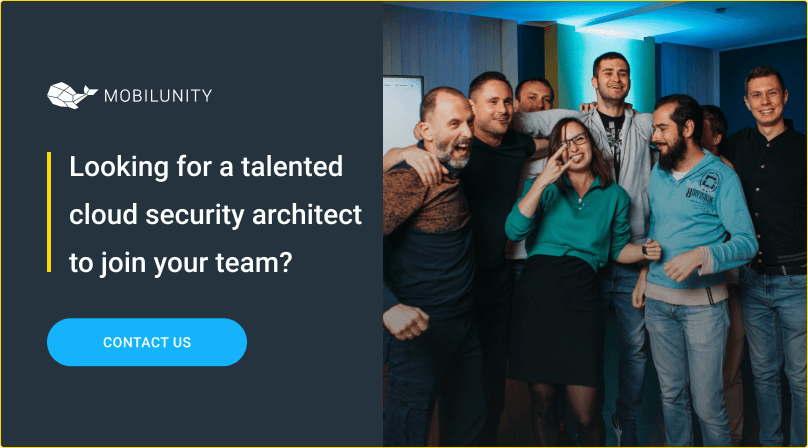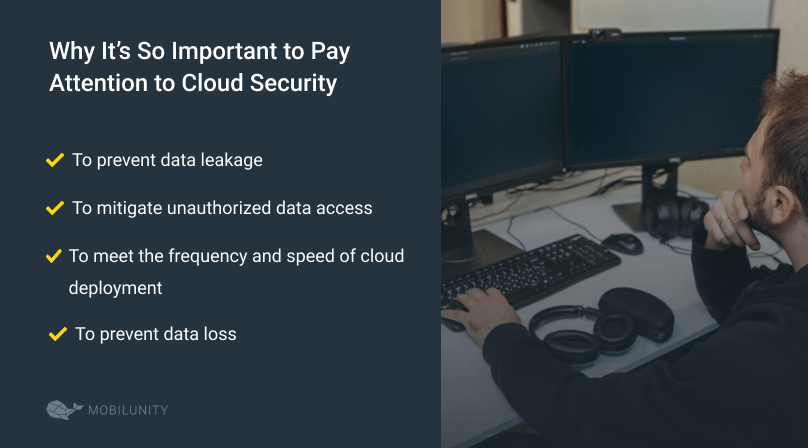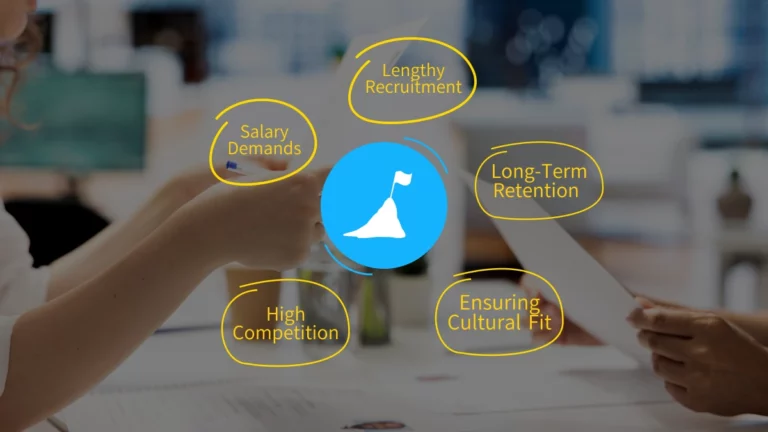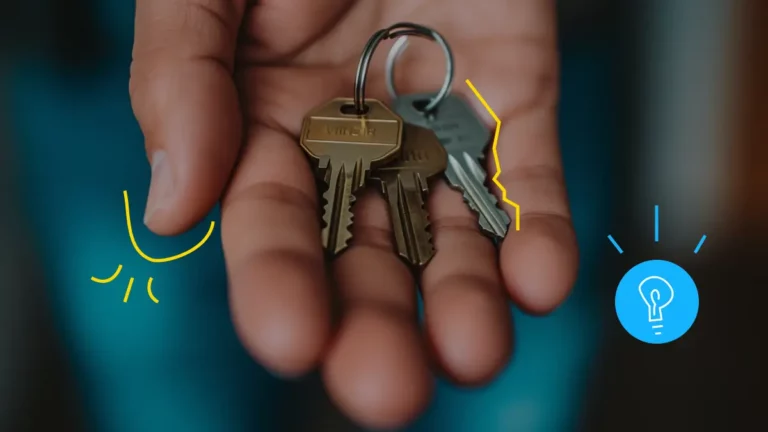Hire Cloud Security Architect
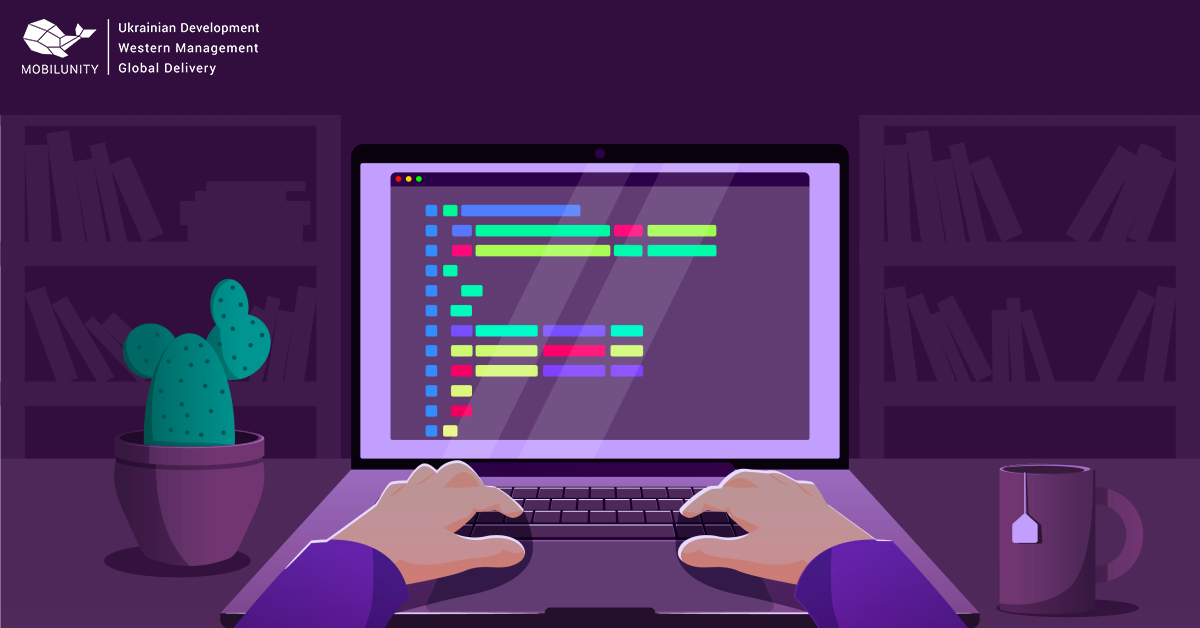
In the era of constant data flow, businesses require a solid level of security, which is guaranteed through cloud security services. In order to design centralized protection of information within the cloud-based platform, companies may refer to Spring engineer who properly covers backend programming to facilitate the process of development.
If the company heavily invests in the cloud, which can be basically accessed from anywhere in the world, it is crucial to protect the data from misuse, leakage, and theft. Let’s define the best practices of cloud security.
| Cloud Platforms | Cloud Security Best Practices |
| AWS | Multi-factor authentication, privilege access, control of all activities in the AWS cloud, and exclusively centralized access for AWS consoles are held for the clients’ personal data protection. Read more about AWS cloud solutions. |
| Oracle Cloud | In order to manage both internal and external levels, they guarantee information encryption at the file level. To detect the potential threat or dynamic data masking, the data is secured with SQL encryption. Moreover, the platform also thoroughly analyzes third-parties, stakeholders, and trading partners if any unauthorized activity occurs. Explore more about the data security level of the Azure Cloud platform. |
| Google Platform Cloud (GCP) | Google Cloud managed to level up its security practices by implementing automated continuous delivery, VPS flow logs and enabled Stackdriver to track and control the uptime of activities happening on the Google Cloud. Check more about Google cloud platform capabilities. |
| IBM Cloud | IBM offers physical protection for the data stored in the cloud. The platform records vulnerable data points, creates firewalls, has limitations in terms of user access management, and has single sign-on services. Learn the full list of IBM cloud solutions. |
| Oracle Cloud | Has Object and File Storage, Block Volume, and Database with on-point security configurations to store the data; the authentication mechanisms are formulated via API keys; computer instances such as Bare Metal and GPUs to guarantee customer application protection. |
Why Does Your Business Need Cloud Security Solution Architect?
With the dramatically growing number of Internet users, web and mobile applications, and devices the number of cyber attacks grows accordingly. With all benefits of cloud computing, including boosted business operations and data interchange, companies need to pay close attention to cloud security, and here are key reasons.
- To prevent data leakage. The primary cause for cloud security implementation is that the data that transfers all over the globe can be easily lost or got into the hands of the third party. With cyber-attacks being on the rise, the data can be especially vulnerable to Distributed Denial of Service attacks (DDoS), where even a slight breach can undermine the business.
- To mitigate unauthorized data access. Corporate employees mainly have access to customers’ data and can access from anywhere and anytime. That is why it is crucial to establish policies and particular protocols. Moreover, they should implement multi-level authentication to guarantee that a particular data is only available for the selected group of people.
- To meet the frequency and speed of cloud deployment. Quite often, organizations run their web and mobile applications in the cloud; however, cloud security cannot be implemented during the processes of development and testing. With this in mind, the security tools come to operation in the deployment stage to monitor the software.
- To prevent data loss. Most enterprises consider that cloud computing providers take care of the data entirely and will compensate for its loss and theft. However, a part of responsibilities remains in the hands of the client as the provider usually minimizes its liabilities.
Who Is a Security Cloud Architect?
Besides providing fundamental services of identifying cloud security solutions, cloud architect security is also experienced in IaaS, PaaS, and SaaS platforms, makes risk-related decisions, implements innovations to align with technological ins and outs. The role of cloud security architect also lies in SIEM and other security tools implementation available in cloud environments. Take a look at the cloud security architect resume to find out more details on skills, experience, and education one must possess.
Cloud Security Architect Resume Sample
Skills
- Planning, organizing, and leading the process of architecture development
- Strong abilities to solve problems
- Influence, initiative in decision making process, interest in evolving technologies
- COBIT, PCI, and NIST or other security frameworks knowledge
- Solid expertise in IaaS, PaaS, and SaaS
- API web services delivery
- Ability to manage the project, including methods and resources used
Experience
- 5+ years in building and designing security cloud systems
- 5+ years in applying security standards and security architecture
- Strong awareness of team management, time management, and client orientation
- Information Security and Cyber Security frameworks
Education
- Master’s degree in Computer Science
- Information Systems Security Professional certification
Besides the solid experience and a rich list of hard skills, a good candidate must possess at least one cloud security architect certification to prove the theoretical background. Cloud data security architect roles include but not limited to decision making, alignment to business goals, and industry peculiarities understanding.
Models of Hiring Cloud Security Solutions Architect
The most usual and traditional way of hiring specialists for the position of cloud application security architect, AWS cloud security architect, or cloud infrastructure security engineer is an in-house model. Most companies still find this approach convenient, reliable, and effective as it is easy to manage the team based in shared office space.
Another way of hiring a cloud security solution architect is on freelancing platforms. As of 2019, there were around 57 billion freelance employees all over the world. This hiring model is cost-effective however, there are no guarantees for quality and deadlines. Moreover, since no official contracts are signed, employers might often lose their employees quite easily.
Security cloud outsourcing and outstaffind are a modern, working, and demanding business strategies that have a chain of benefits. In 2019, the global market of outsourcing was estimated to be $92.5 billion. It gives the companies lower labor costs, technological edge, access to new marketplaces, and a vast number of IT specialists with an innovative eye to your business. The countries in CEE remain highly attractive for companies from Japan, the United States, and Canada. Ukraine is one of the countries with the largest pool of talents in CEE, significantly affordable prices for labor, and a vastly developing IT market.
Mobilunity Offers a Rich Pool of Cloud Security Architects
9+ years in the industry, 40+ of clients from diverse countries, quality services, and more – Mobilunity has established a solid and competitive position on the local IT market being a reliable vendors for worldwide companies. The core values of the company lie in 3Rs, namely Recruitment, Relatioshot, Retention, meaning that your remote team managed properly. Mobilunity will:
- Select the most suitable employees, accurately following your requirements to find professional security architect cloud
- Assist you in managing your team
- Offer constant communication and feedback system (DevOps cloud security architect teams mostly operate on Agile methodologies)
- Provide with cost-effective rates without hidden charges
- Offer contract-based cooperation
- Provide the opportunity to scale up or down your team size
